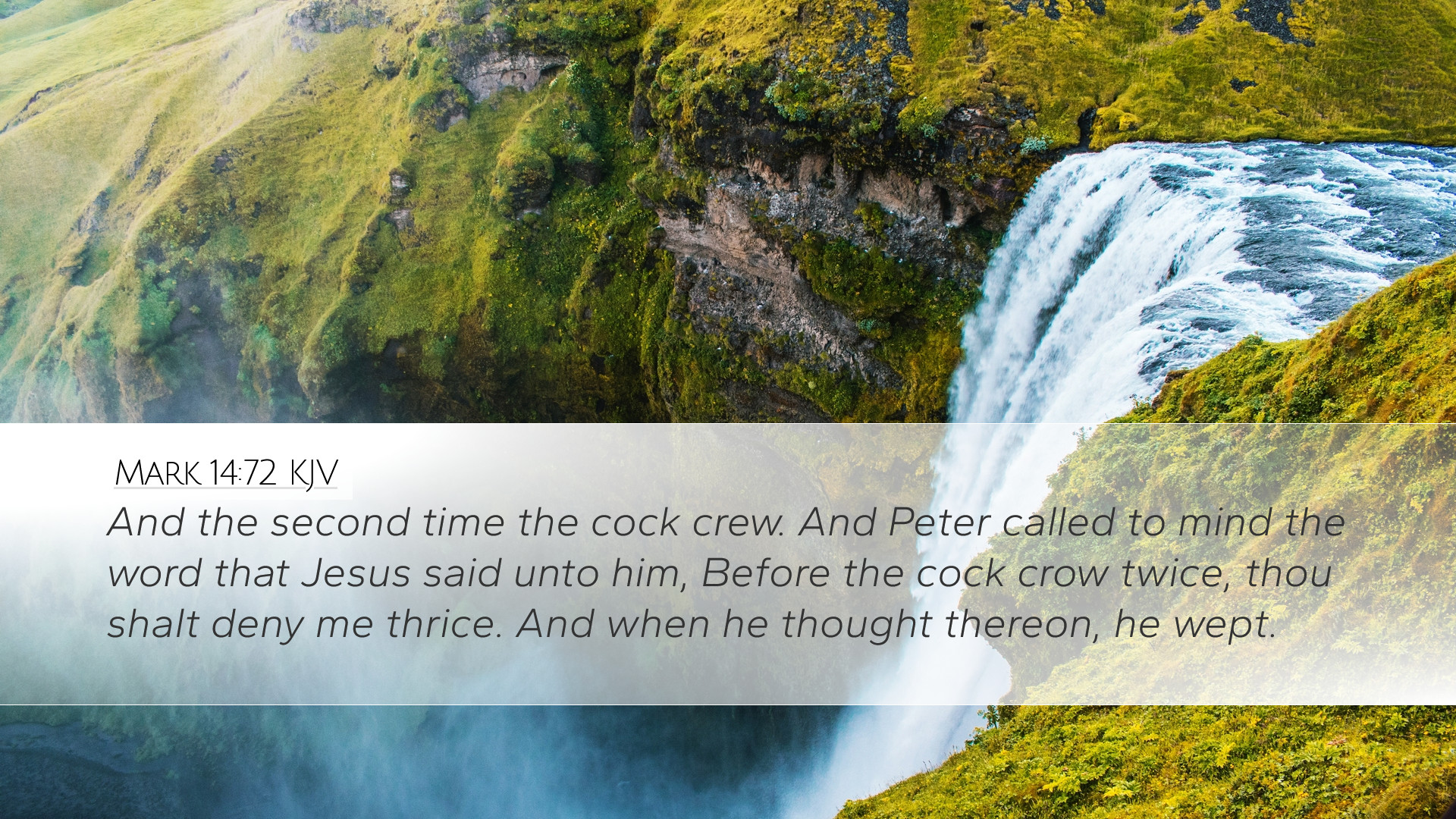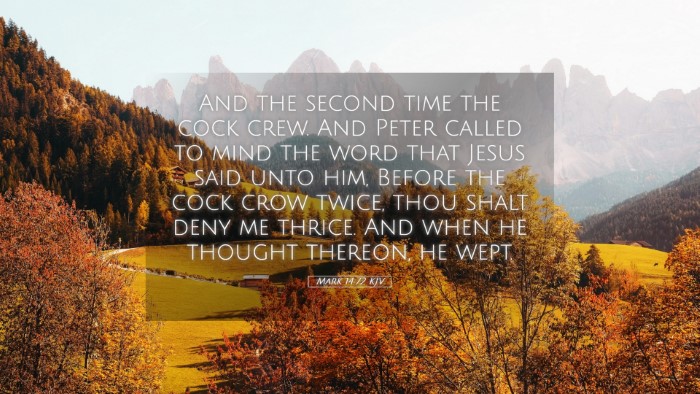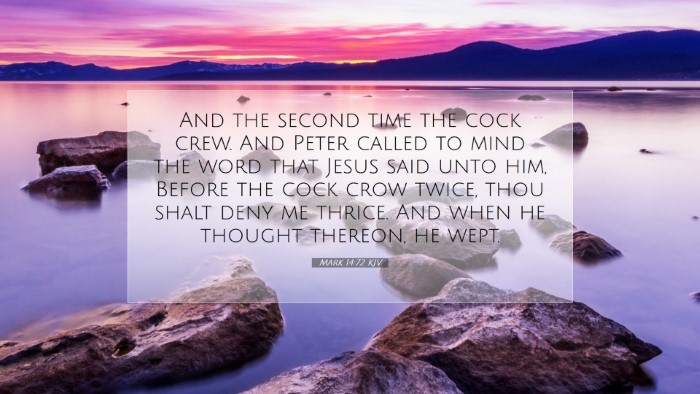Commentary on Mark 14:72
Mark 14:72 states, "And the second time the cock crew. And Peter called to mind the word that Jesus said unto him, Before the cock crow twice, thou shalt deny me thrice. And when he thought thereon, he wept." This verse encapsulates a significant moment of realization and remorse in Peter's life following his denial of Christ. The weight of this scripture is profound, invoking themes of foresight, human frailty, redemption, and sorrow.
Contextual Background
To understand the depth of this verse, we must consider the context in which it was spoken. Peter, a devoted disciple of Jesus, had earlier professed his loyalty and even boastfully declared he would never forsake the Lord. However, the events leading up to the crucifixion led him into a situation fraught with fear and pressure, ultimately leading to his denial of knowing Jesus three times, as foretold by Christ.
Insights from Commentators
Matthew Henry
Matthew Henry notes that the crowing of the rooster serves as a pivotal moment for Peter. He emphasizes that Peter’s identification of this event with Jesus' prophecy reveals the power of Christ's foreknowledge. Henry articulates this moment as a transition from pride to humility, reflecting the necessity for repentance. He draws on the symbolism of the rooster crowing twice, suggesting that it served as an audible reminder of human frailty and the need for vigilance in faith. Furthermore, Henry posits that Peter's subsequent weeping illustrates the sorrow of a repentant heart when confronted with sin.
Albert Barnes
Albert Barnes elaborates on the details surrounding Peter's denial and the emotional turmoil experienced at the moment of realization. He emphasizes that Peter’s recollection of Jesus’ prophecy—before the cock crows twice, you will deny me thrice—serves as an indictment of his own weakness. Barnes regards Peter’s denial as not merely an act of cowardice but a deep-seated fear stemming from the intense persecution faced by Christ. He offers a compassionate perspective, suggesting that many believers can relate to Peter’s experience of failure and sorrow, and he highlights that true repentance comes from recognizing one’s missteps in relation to God’s expectations.
Adam Clarke
Adam Clarke focuses on the psychological aspect of Peter's realization, observing how the moment the rooster crowed evoked intense feelings of guilt and remorse. Clarke discusses the notion of prophetic fulfillment, suggesting that the impact of Peter’s denial was compounded by his previous assertions of loyalty. He examines the symbolism of the cock crowing, indicating that it serves as a wake-up call not just for Peter but for all believers to remain steadfast in their commitment to Christ. Moreover, Clarke emphasizes the importance of sincere contrition, implying that Peter’s weeping was a necessary step toward restoration and forgiveness from Christ.
Theological Significance
This verse holds significant theological implications, particularly concerning the nature of sin and redemption. It underscores the concept that even the most devout can succumb to failure, revealing the importance of humility and dependence on God's strength rather than one's own. The juxtaposition of Peter’s boastfulness versus his moment of despair invites believers to reflect on their spiritual journeys and the necessary path of repentance.
Human Nature and Redemption
Mark 14:72 challenges readers to confront their vulnerabilities. The fact that Peter—a leading apostle—could deny Christ reinforces the message that every believer is susceptible to sin. However, the narrative also hints at the transformative power of confession and repentance. Peter's weeping is emblematic of a heart that grasps the magnitude of its failings while looking toward the possibility of forgiveness.
Lessons for Believers
- Humility: Recognizing one’s weaknesses encourages humility and a reliance on God’s grace.
- Vigilance: The need for spiritual vigilance is clear; believers must remain alert to the trials that may lead them astray.
- Repentance: Genuine sorrow for sin leads to restoration. Repentance is not just an acknowledgment of wrong but also a heartfelt return to God.
- Hope: Peter’s story does not end in despair. It is a testament to the reinstating power of Christ, demonstrating that failure does not define one's relationship with God.
Concluding Thoughts
The narrative encapsulated in Mark 14:72 serves as both a warning and a source of hope. It encourages reflection on personal fidelity to Christ while simultaneously offering assurance of His forgiving nature. As pastors, students, theologians, and Bible scholars delve into this verse, they are invited to explore the complexities of faith, the reality of human weakness, and the profound depths of God’s grace.
In the light of this scripture, let us strive for a deeper understanding of our faith and our propensity to falter, while ever clinging to the hope that lies in Jesus Christ, who restores and redeems.


